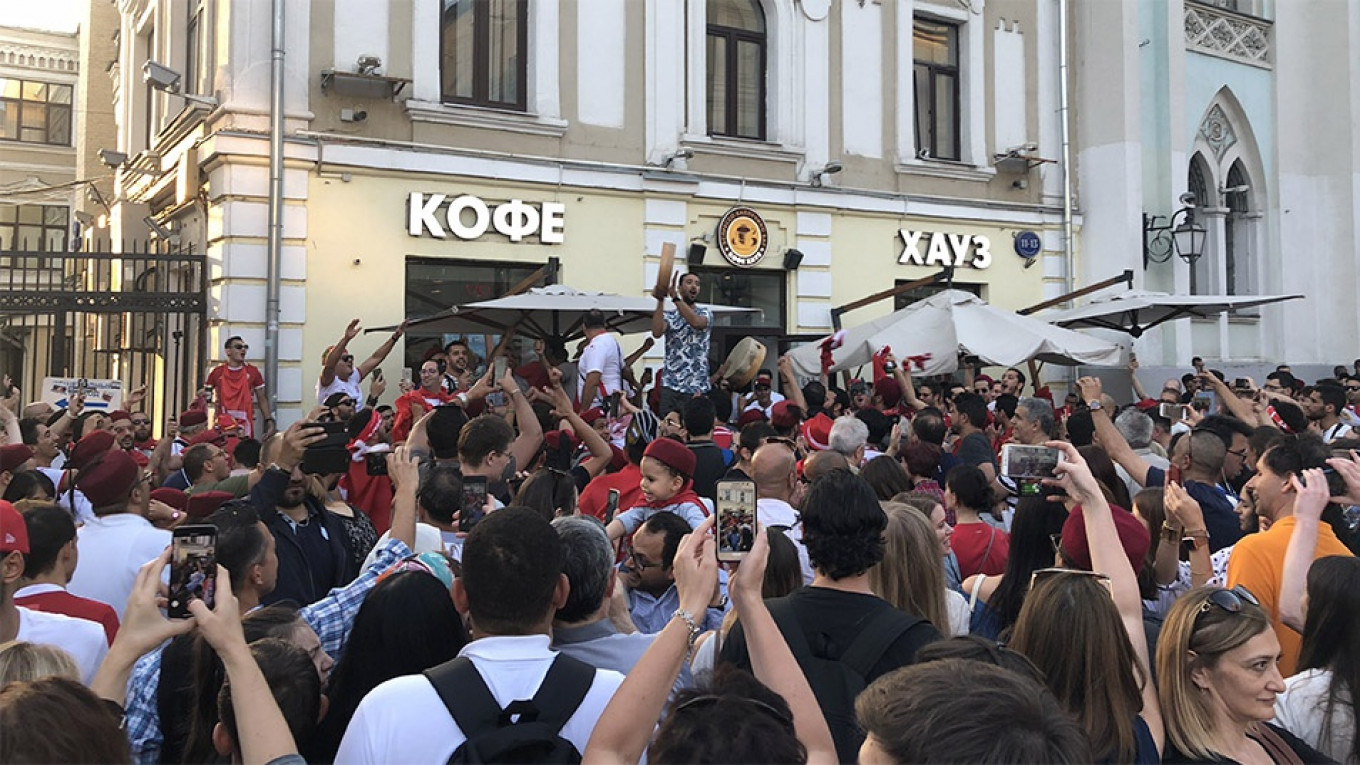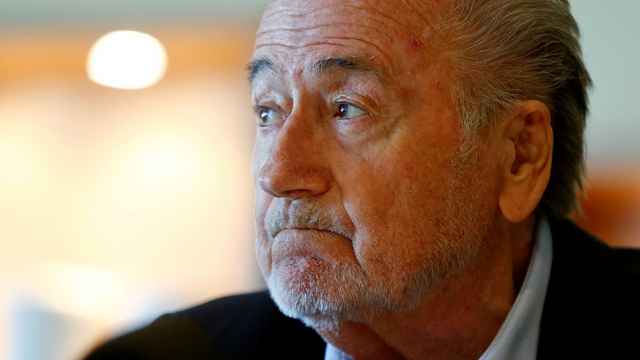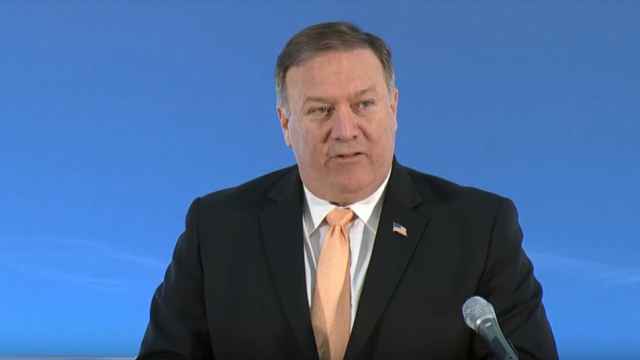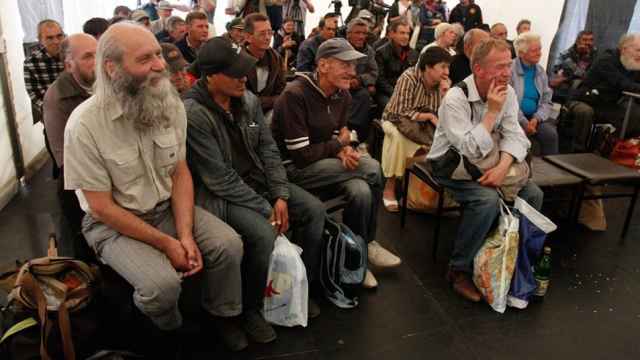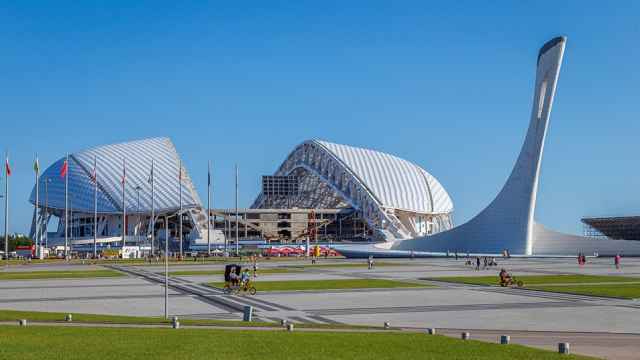Red Square in Moscow is probably Russia’s best-known tourist spot, but since the World Cup kicked off two weeks ago, a sleepy street leading away from the iconic landmark has stolen the limelight.
Although Nikolskaya Ulitsa, which stands in the shadow of the lavish GUM department store, is not a designated FIFA fan zone, it has quickly become party central for tens of thousands of football fans from Russia and abroad.
Stewart and Paul, from Doncaster, England, went straight to Nikolskaya after arriving in Russia. They told The Moscow Times they had “heard about the ‘street of lights’ before even coming here.”
As fans from around the world, with wallets wide-open, descend on the 600-meter pedestrianized street to celebrate and mourn their teams’ performances, many businesses lining the street are emerging as the real winners.
The director of a busy sports bar called Wings, Irina Yegorova, nodded to a group of Moroccans leaning against the bar before saying the fans “have been an incredible boost to business.”
“After walking around the city all day, they need a place to eat and drink,” Yegorova told The Moscow Times. “Turnaround has increased fivefold.”
Big spenders
“Sales have increased quite a bit,” agreed Albina, the manager of the upscale restaurant called Miramar who, like other managers, declined to give her last name. “We haven’t had an empty table for a week now.”
“Our food may be more refined,” she added, comparing the average price of a meal at her restaurant to others on the busy thoroughfare. “But that hasn’t stopped the fans from piling in.”
While the flow of customers is bringing in money, some restaurant owners realize it will probably only last as long as the football does. “Whether it’s because the other cafés are full or because they feel like treating themselves, fans aren’t really distinguishing between places,” she told The Moscow Times. “Both KFC [a fast-foodstore] and Miramar have lines outside them.”
Outside the Azbuka Vkusa grocery chain, where fans had occupied the front steps of the store, branch manager Maxim said sales had surged threefold. “They don’t really notice the prices,” he said. “The fans must be having a good time.”
Local managers agree that beer is their top-selling product. “It’s mainly Corona for the Mexicans,” Maxim said jokingly. Indeed, in addition to the authentic football atmosphere, Stewart and Paul from England said what brought them to the street was the “cheap beer.”
Souvenir shops are also feeling the benefits — and pressures — of the higher volume of customers. The first store after the Red Square entrance was packed to the point that none of the recently hired assistants could stop to speak.
Further down the street, Eduard, an assistant manager at a souvenir shop, described a discount program his shop had on the first day of the World Cup. “Every item on sale was gone,” he said. “We couldn’t keep up with demand... We have always had tourists coming in, but this is a whole different story.”
Expensive countdown
Not all businesses, however, have got an equal share. Olga and Tatyana from the Samson-Pharma chain of pharmacies said football fans weren’t their shop’s “target customer.”
Sitting between empty aisles of medicines, they said they still occasionally sold band-aids, water and sunscreen, but that sales of their more expensive products, like specialty cosmetics, had dropped. “They just don’t need them,” Tatyana told The Moscow Times.
Yelena, the director of the Coffee House chain, had mixed feelings about the arrival of the beer-guzzling football enthusiasts, saying she couldn’t have asked for better customers. Still, she said, they “constantly break glasses and block the doorway to my shop.”
The manager of the Wings sports bar similarly had not made up her mind, saying tactfully that the fans could get very “rowdy.”
The manager at the Azbuka Vkusa grocery store said “there’s a mess outside, and they bring it into the store.”
He added that while he has seen an uptick in shoplifting, the biggest issue was that the crowds had “completely disrupted the flow of regular customers.”
Yevgenia, the director of the Spanish Tous jewelry store, noted that their sales had been hit by the World Cup. “The streets are closed off and there’s too much traffic in the center,” she said.
Aside from the fact that the historic building her shop is located in had been tagged with graffiti, she said the atmosphere had become very “touristy,” a perhaps diplomatic turn of phrase that Alexandra, the administrator at the Novaya Zarya perfume shop, also used.
Both Alexandra and Tatyana from the pharmacy said that locals and the regular customer base stopped coming in because getting there became “inconvenient,” especially with the “drunk and disorderly” crowds.
Svetlana Yakubova, manager of the Linzmaster glasses store, was happy that Russia could be in the spotlight for a bit. But, she added, she’ll also be glad to see life on the street return to normal.
“[We’re] waiting for the crowds to die down so that our regular customers can return.”
A Message from The Moscow Times:
Dear readers,
We are facing unprecedented challenges. Russia's Prosecutor General's Office has designated The Moscow Times as an "undesirable" organization, criminalizing our work and putting our staff at risk of prosecution. This follows our earlier unjust labeling as a "foreign agent."
These actions are direct attempts to silence independent journalism in Russia. The authorities claim our work "discredits the decisions of the Russian leadership." We see things differently: we strive to provide accurate, unbiased reporting on Russia.
We, the journalists of The Moscow Times, refuse to be silenced. But to continue our work, we need your help.
Your support, no matter how small, makes a world of difference. If you can, please support us monthly starting from just $2. It's quick to set up, and every contribution makes a significant impact.
By supporting The Moscow Times, you're defending open, independent journalism in the face of repression. Thank you for standing with us.
Remind me later.


